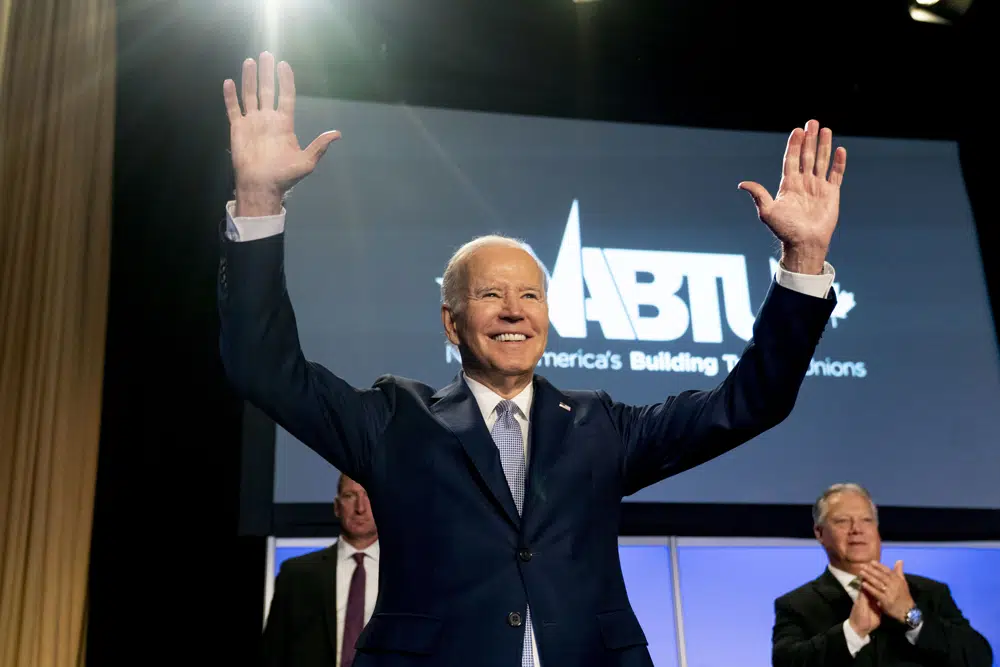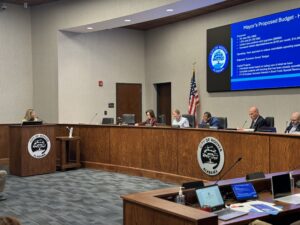Legislature could address judge shortage this year Speaker Nathaniel Ledbetter says

The Alabama House of Representatives passed the largest state general fund budget (SGF) in state history on Tuesday. The over three billion SGF has nearly doubled since 2015 when legislators had to raid the state’s savings account – the Alabama Trust Fund – to keep Medicaid afloat and most non-education state agencies operable. Mental Health was cut dramatically in that period, as was maintenance on Alabama’s aging prison infrastructure. Both of those decisions have come with consequences moving forward. One area where those post-Great Recession general fund woes have had an enormous impact is on judges. The state’s population is now over five million. The state’s population has grown by over a million people since 1990, and the number of judges on the bench has not kept up. That growth has not been evenly distributed, however. Thirty-five years ago, Huntsville was a farming community with a military base and a NASA site. Today it is the largest city in the state. Baldwin County has boomed. Elmore, Shelby, Lee, Limestone, St. Clair, Autauga, and Dekalb Counties have all grown in that period at a faster rate than the state as a whole. Subdivisions now stand where cows once grazed. In 2015 judges, especially in those fast-growing counties, struggled with large caseloads. The judiciary needed more judges then, but the general fund had seen revenues decline by over 20% since 2008, so there was no money to give to the court system. The Legislature responded to those concerns by passing reallocation. The Courts were ordered that when a judge retires in an area like the Black Belt, Jefferson County, Montgomery County, or West Alabama, that judgeship would be abolished and reallocated to a growing area like Baldwin or Madison County. “That has not happened,” Speaker of the House Nathaniel Ledbetter told reporters on Tuesday. “Reallocation has not worked.” “There have been two or three vacancies that should not have been filled,” Ledbetter said. “My County (Dekalb) is 2.7 judges short,” Ledbetter said. “In 2015, we passed reallocation, and we were two judges short. Now we are almost three.” Chief Justice Tom Parker said in 2021 that the Judiciary system had done a study that showed that the state need 21 additional judges. While the general fund budget that passed out of the House on Tuesday had no funding for additional judges, House budget chair Rex Reynolds acknowledged that the state has an issue with growing case dockets and is working on the issue. “I am going to meet with the judges tomorrow,” Reynolds said. “There has to be something done,” Ledbetter said. “There is an appetite to fix it.” Reynolds said three bills have been introduced, including one by Sen. Sam Givhan, to address the judge shortage issue. “I am going to show them (the judges) the three bills and ask them which they like,” Reynolds said. “It is something we have got to look at,” Reynolds said. The state general fund budget passed on Tuesday includes a two percent pay raise for state employees and considerable increases in money for prisons and mental health. “I was excited to see it pass today,” Ledbetter said. “Chairman Reynolds and that committee has worked really hard.” Ledbetter acknowledged that even though the general fund is larger than ever,” It is hard to spread the money out and make everything happen.” The budget, including a sizable supplemental appropriation for this year, now goes to the Senate Finance and Taxation General Fund Committee – chaired by Sen. Greg Albritton. “Sen Albritton and he (Reynolds) have been working together since summer,” Ledbetter said. Reynolds said that if the Senate makes major changes to the budget, he will ask that the House non-concur. Ledbetter said that that would not be surprising. “Most of the time, the General fund and education budget go to conference committee,” Ledbetter explained. “Alabamians can be proud,” of the improvement in state budgets over the last several years, Ledbetter said. “When I first came in (2015), we could hardly pay the light bill.” Ledbetter predicted that the education budget will be out of committee in the Senate next week. “We will have it in the Senate next week,” Garrett said. “If not, then the following. Chairman (Danny) Garrett thinks it will be next week.” Ledbetter is the former Mayor of Rainsville. Alabama has an arcane budgeting system where over 90 percent of the money is earmarked. There are two separate budgets and billions of dollars outside of the two budgets making moving funds from where there is excess revenue to the greatest need difficult and sometimes constitutionally impossible. Thursday will be day 15 of the 2023 Alabama Regular Session. To connect with the author of this story or to comment, email brandonmreporter@gmail.com.
Legislature passes bill allowing social workers to diagnose mental illness

On Tuesday, the Alabama Senate State voted 32 to 0 to pass legislation allowing certain highly trained social workers to diagnose mental illnesses. The bill had already passed the House of Representatives 104 to 1. House Bill 56 (HB56) is sponsored by State Representative Frances Holk-Jones. It was carried in the Senate by State Senator Linda Coleman-Madison. HB56 has already passed the House 104 to 1. Sen. Coleman-Madison said, “It gives me great pleasure to present this bill.” “There is a limited number of social workers in our state,” Coleman-Madison said. “This will expand their scope of practice.” “We need social workers in the state,” Coleman-Madison said. “I am very supportive of the bill,” Sen. Will Barfoot said. “My Aunt is in the Social Worker Hall of Fame.” Barfoot said that his daughter is in her final year of college to be a social worker. “There is a huge need for social workers in our state: geriatric, veterans, in the schools, and working with mental health,” Barfoot explained. Sen. Dan Roberts said, “I congratulate you for working on this bill.” Rep. Holk-Jones explained to the Senate State Governmental Affairs Committee that “Alabama is currently the only state that does not allow” these highly trained social workers to diagnose mental illness. “We are losing these social workers to other states,” Holk-Jones said. “This allows people to get diagnosed and treatment without traveling to see a medical professional.” Sen. Coleman-Madison sponsored the Senate version of the bill, SB109, which had already passed the Senate. SB109 likely will remain in committee as the House version has already passed both Houses. The legislation expands the scope of practice of a licensed independent clinical social worker, including the authority to diagnose and develop treatment plans. “The scope of practice does not include the diagnosis, treatment, or provision of advice to a client for problems or complaints relating to conditions outside the boundaries of the practice of social work.” The legislation states that no individual may engage in the independent clinical practice of social work unless they satisfy all of the following: (1) Licensed is licensed under this chapter as a licensed independent clinical social worker; and. (2) Has a doctorate or master’s degree from a school of social work approved, accredited, or in candidacy granted by the Council on Social Work Education; and. (3) Has had two years of full-time or three years of part-time postgraduate experience under appropriate supervision in the specified social work method or four years of full-time or five years of part-time postgraduate experience under appropriate supervision in the specialty in which the applicant will practice. (4) Has passed an examination prepared by the board for this purpose; except that prior to the time that an examination is prepared by the board for this purpose, no person individual who otherwise meets the requirements of this section will be prohibited from engaging in the private independent practice of social work; and. (5) Has been issued by mail a certified letter of certification stating his or her qualification for private independent practice by the board; and. (6) Has paid an initial certification fee set by the board. “The terms diagnose and treatment, whether considered in isolation or in conjunction with the rules of the board, may not be construed to permit the performance of any act which a licensed clinical social worker is not educated or trained to perform including, but not limited to, any of the following: (1) Administering and interpreting psychological tests or intellectual, neuropsychological, personality, or projective instruments. (2) Admitting any individual to a hospital for treatment of any condition that is outside the boundaries of the practice of social work, as provided in subsection (b). (3) Treating any individual in a hospital setting without medical supervision. (4) Prescribing medicinal drugs. (5) Authorizing clinical laboratory procedures or radiological procedures. (6) Using electroconvulsive therapy. The state of Alabama has a significant shortage of mental health professionals. Coleman-Madison said, “I am carrying this for Rep. Holk-Jones. I think this is her first bill.” Since HB56 has been passed in both Houses in the same form, the legislation now goes to Gov. Kay Ivey for her consideration. Tuesday was day 14 of the 2023 Alabama Regular Legislative Session. To connect with the author of this story or to comment, email brandonmreporter@gmail.com.
Senate Committee to consider school choice bill

On Wednesday, the Senate Education Policy Committee will meet to consider school choice legislation. Senate Bill 202 (SB202) is sponsored by Sen. Larry Stutts. The Parental Rights In Children’s Education (PRICE) Act for K-12 education “would secure the fundamental constitutional rights of parents to direct the education of their children according to their religious faith, beliefs, values, and morals. This bill would create and provide for the PRICE Program and would establish a three-year phase-in period.” It establishes a Parent Advisory Board and “would provide for the funding of the PRICE ESA Fund and the PRICE Administration Fund for the costs of administering the PRICE Program.” The bill would also provide for implementing and administrating the PRICE Program and using education savings accounts. It would specify the qualified expenses that can be paid from an education savings account. The bill would give parents $6,900 to put into an Education Savings Account that the parents could use at a public school, a public charter school, a private school, or a religious school. The Alabama Republican Party has been adamant that the Party favors giving parents the power to decide where they send their kids to school. Yet, the overwhelming majority of children in the state are still trapped with only the option to go to the legacy public school they are assigned to. The GOP released a poll on Tuesday showing that most Alabama voters want school choice in the state of Alabama. The poll asked 1,610 respondents the following question: “The State Legislature is considering a bill that would allow parents to choose which schools their children attend using state funds. Do you support or oppose school choice legislation?” 57% answered support, only 16% responded that they oppose, and 27% said they were undecided. The GOP has a commanding supermajority in both Houses of the Legislature, so they can pass this if they choose to. Many legislators, however, fear pushback from teachers, superintendents, and prominent supporters of local public school systems. The GOP polls showed that support for school choice was highest among Republican voters (67% to 9%) but also overwhelmingly popular with independent voters (55% to 17%) and still the first choice among Democrats (37% to 30%). The survey also showed school choice had extremely strong support from black voters (52% to 21%). In 2022 then, Senator Del Marsh brought his school choice bill to the same committee, and it was effectively killed there without reaching the floor of the Senate. Dozens of Alabama’s public school superintendents flooded the room and were all over that session lobbying to kill that bill. The school superintendents were joined by the Alabama Education Association in steadfast opposition to the bill. Proponents of school choice argue that competition will benefit Alabama’s children and that if multiple schools compete for students, that will produce improved performance. Proponents say that the parent will act in the best interest of their child and will send them to the school that best serves the child academically with the family’s value system and religious beliefs. Polling shows that protecting children from “Woke indoctrination” by liberal public school teachers, curriculum, and texts has become an increasingly important issue with Alabama families. Opponents argue that if tax dollars are allowed to follow the children to private and religious schools that the most involved parents, higher-income families, and the most talented students will leave the public system leaving the legacy system underfunded and with the remaining student body increasingly poor and disadvantaged. Some opponents also oppose tax dollars going to religious schools. The Committee will meet at 9:00 a.m. in the Finance and Taxation Room on the eighth floor of the Alabama State House. Thursday will be day 15 of the 2023 Alabama Regular Legislative Session. To connect with the author of this story or to comment, email brandonmreporter@gmail.com.
Katie Britt: Alabama is expanding the limits of human achievement

On Tuesday, U.S. Senator Katie Britt highlighted Alabama’s critical contributions to the next era of American space exploration during a recent hearing of the Commerce, Justice, Science, and Related Agencies (CJS) Subcommittee of the Senate Committee on Appropriations with NASA Administrator Bill Nelson. Britt extolled the many contributions to the advancement of space exploration made by the scientists and engineers at Marshall Space Flight Center in Huntsville. 7,000 Alabamians work at Marshall. “They have created a legacy of excellence,” Britt stated. “The men and women there have put in the work to literally take us to new heights, and we are all better for it.” On November 16, 2022, NASA successfully launched the most powerful rocket in history – the Space Launch System (SLS) – for the first time during Artemis I. Marshall’s engineers designed the SLS, and Marshall is tasked with leading the management of and testing for the SLS program. “Tens of thousands of very talented and smart people throughout the country – including in my home state of Alabama – were responsible for a flawless SLS launch,” Britt continued. “I am deeply proud of what they have accomplished, and I’m very interested in making sure we keep this momentum going.” There have been many astronauts and cosmonauts in the last 50 years, but they have all gone to the same place: low Earth orbit. Not since the Apollo missions has man ventured further out. NASA will return Americans to the Moon as early as 2025. The Artemis II mission next year will take astronauts back to Moon orbit. Artemis III will put an American back on the Moon for the first time since Apollo 17 in 1972. Artemis IV in 2028 will set the stage for NASA to continue missions to the lunar surface annually. The SLS will be used to launch a man to Mars sometime in the late 2030s if all goes well. “NASA has set a bold vision for the future, one defined by innovation and exploration throughout the heavens,” Administrator Nelson said in his testimony before the subcommittee. Sen. Britt questioned Administrator Nelson about the funding needed to keep the Artemis program on schedule and meet NASA’s lofty goals. “We have to take advantage of the progress we have made and the workforce that has been built over the years. We need to be preparing now for a more sustained cadence of launches for Artemis IV, V, and beyond,” Britt said. “There will be a new generation of boys and girls across America who look up to the Moon at night, knowing that walking its surface is not just a dream but a reality. Once again, it will be thanks to the innovation, grit, and determination of Alabamians that our nation not only expands the limits of human achievement – but quite literally grows the imagination of what one day might and will be possible.” Landing on the Moon remains a complex engineering feat. A Japanese corporation, ispace, apparently has failed in its recent effort to land two rovers on the Moon. The mission to land a Japanese-designed rover and a United Arab Emirates-built rover has failed to communicate back that it has successfully landed on the Moon. While engineers are still working on establishing communications with the lander, the assumption is that the landing has failed. Ispace would have been the first private company to successfully land a spacecraft on the Moon. Only NASA, the former Soviet Union, and China have been able to accomplish that to this point in time. Ispace has signed a contract with NASA to deliver unmanned loads of cargo to the Moon in support of NASA’s ambitious plan to return astronauts to the Moon. At this point, it is unknown how this apparent failure will impact those plans. NASA recently released its first Moon to Mars Architecture review. This is the technology that the space agency needs to accomplish its lofty mission goals in the next twenty years. China also has ambitious plans to send its astronauts to the Moon and Mars. Nelson said it is possible that China could attempt to dominate Moon exploration. “It is a fact: we’re in a space race,” Nelson told Politico. “And it is true that we better watch out that they don’t get to a place on the Moon under the guise of scientific research.” Nelson is scheduled to testify before the House Science Committee on Thursday. Katie Britt was elected in 2022. To connect with the author of this story or to comment, email brandonmreporter@gmail.com.
Attorneys general support Florida ban on Medicaid payments for gender transition procedures

Seventeen attorneys general have filed an amicus brief supporting Florida’s healthcare regulation that denies Medicaid coverage for gender transitioning procedures. They’re supporting Florida’s motion for summary judgment in the lawsuit August Dekker v. Jason Weida in the U.S. District Court Northern District of Florida Tallahassee Division. In the case, transgender plaintiffs are suing Weida, the secretary of the Florida Agency for Health Care Administration. Alabama Attorney General Steve Marshall is leading the coalition, which also includes the attorneys general of Arkansas, Georgia, Indiana, Iowa, Louisiana, Kentucky, Mississippi, Missouri, Montana, Nebraska, North Dakota, South Carolina, Tennessee, Texas, Utah, and Virginia. The brief said evidence suggests the medical interest groups in the case that have promulgated guidelines or treatment statements are advocates for transitioning treatments and that they suppress dissent. “These groups do not represent ‘medical opinion,’ just an outspoken slice of it,” the brief said. The brief said that the groups are at odds with four European countries whose healthcare authorities assessed transitioning treatments and called for curtailing the availability of transitioning treatments for minors. Those countries are the United Kingdom, Sweden, Finland, and Norway. “Based on the evidence reviews they conducted (or are conducting), healthcare authorities in these countries have called for curtailing the availability of transitioning treatments for minors,” the brief said. “As the council responsible for the assessment of public healthcare services in Finland put it, ‘[i]n light of available evidence, gender reassignment of minors is an experimental practice.’ Florida’s like conclusion was reasonable.” Louisiana Attorney General Jeff Landry said in a news release that states have the right to regulate medicine and determine appropriate treatments for Medicaid coverage. “Our tax dollars should not be spent on life-altering and damaging experimental medical treatments,” Landry said. “Florida’s comprehensive review does not support the use of puberty blockers, cross-sex hormones, and reassignment surgeries as safe and effective treatments for gender dysphoria; and the Sunshine State should be allowed to follow the science.” Republished with the permission of The Center Square.
Joe Biden announces 2024 reelection bid: ‘Let’s finish this job’

President Joe Biden on Tuesday formally announced that he is running for reelection in 2024, asking voters to give him more time to “finish this job” and extend the run of America’s oldest president for another four years. Biden, who would be 86 at the end of a second term, is betting his first-term legislative achievements and more than 50 years of experience in Washington will count for more than concerns over his age. He faces a smooth path to winning his party’s nomination, with no serious Democratic challengers. But he’s still set for a hard-fought struggle to retain the presidency in a bitterly divided nation. In his first public appearance Tuesday since the announcement, Biden offered a preview of how he plans to navigate the dual roles of president and presidential candidate, using a speech to building trades union members to highlight his accomplishments and undercut his GOP rivals, while showing voters he remained focused on his day job. Greeted with chants of “Let’s Go Joe” from a raucous crowd of building trades union members — a key base of Democratic support — Biden showcased the tens of thousands of construction jobs being created since he took office that are supported by legislation he signed into law. “We — you and I — together, we’re turning things around, and we’re doing it in a big way,” Biden said. “It’s time to finish the job. Finish the job.” Biden’s campaign announcement, in a three-minute video, comes on the four-year anniversary of when he declared for the White House in 2019, promising to heal the “soul of the nation” amid the turbulent presidency of Donald Trump — a goal that has remained elusive. “I said we are in a battle for the soul of America, and we still are,” Biden said. “The question we are facing is whether in the years ahead we have more freedom or less freedom. More rights or fewer.” While the prospect of seeking reelection has been a given for most modern presidents, that’s not always been the case for Biden. A notable swath of Democratic voters has indicated they would prefer he not run, in part because of his age. Biden has called those concerns “totally legitimate,” but he did not address the issue head-on in his launch video. Yet few things have unified Democratic voters like the prospect of Trump returning to power. And Biden’s political standing within his party stabilized after Democrats notched a stronger-than-expected performance in last year’s midterm elections. The president is set to run again on the same themes that buoyed his party last fall, particularly on preserving access to abortion. “Freedom. Personal freedom is fundamental to who we are as Americans. There’s nothing more important. Nothing more sacred,” Biden said in the launch video, depicting Republican extremists as trying to roll back access to abortion, cut Social Security, limit voting rights, and ban books they disagree with. “Around the country, MAGA extremists are lining up to take those bedrock freedoms away.” As the contours of the campaign begin to take shape, Biden plans to run on his record. He spent his first two years as president combating the coronavirus pandemic and pushing through major bills such as the bipartisan infrastructure package and legislation to promote high-tech manufacturing and climate measures. The president also has multiple policy goals and unmet promises from his first campaign that he’s asking voters to give him another chance to fulfill. “Let’s finish this job. I know we can,” Biden said in the video, repeating a mantra he said a dozen times during his State of the Union address in February. Vice President Kamala Harris, who was featured prominently alongside Biden in the video, held a political rally at Howard University in Washington on Tuesday evening in support of abortion access, kicking off her own efforts to support the reelection effort. Saying she’s “proud to run for reelection with President Joe Biden,” Harris added, “Our hard-won freedoms are under attack. And this is a moment for us to stand and fight.” In the video, Biden speaks over brief clips and photographs of key moments in his presidency, snapshots of diverse Americans, and flashes of outspoken Republican foes, including Trump, Florida Gov. Ron DeSantis, and Rep. Marjorie Taylor Greene of Georgia. He exhorts supporters that “this is our moment” to “defend democracy. Stand up for our personal freedoms. Stand up for the right to vote and our civil rights.” Biden also plans to point to his work over the past two years shoring up American alliances, leading a global coalition to support Ukraine’s defenses against Russia’s invasion and returning the U.S. to the Paris climate accord. But public support in the U.S. for Ukraine has softened in recent months, and some voters question the tens of billions of dollars in military and economic assistance flowing to Kyiv. The president also faces lingering criticism over his administration’s chaotic 2021 withdrawal from Afghanistan after nearly 20 years of war, which undercut the image of competence he aimed to portray, and he’s the target of GOP attacks over his immigration and economic policies. As a candidate in 2020, Biden pitched voters on his familiarity with the halls of power in Washington and his relationships around the world. But even back then, he was acutely aware of voters’ concerns about his age. “Look, I view myself as a bridge, not as anything else,” Biden said in March 2020, as he campaigned in Michigan with younger Democrats, including Harris, Sen. Cory Booker of New Jersey and Michigan Gov. Gretchen Whitmer. “There’s an entire generation of leaders you saw stand behind me. They are the future of this country.” Three years later, the president now 80, Biden allies say his time in office has demonstrated that he saw himself as more of a transformational than a transitional leader. Still, many Democrats would prefer that Biden didn’t run again. A recent poll from The Associated Press-NORC Center for Public Affairs Research shows just 47% of Democrats say they want him to seek a second term, up from 37% in February. And Biden’s verbal — and occasional physical — stumbles have become fodder for critics trying to
Steve Flowers: Alabama has a host of outstanding political leaders under 45

It may appear to you and most casual observers of Alabama politics that our Alabama elected officials are old. That observation is accurate when you observe our current leaders in the highest offices. The governor’s office has been held by mature folks in recent years. Our current Governor, Kay Ivey, is 78 and has been the object of national media humor for appearing to be a pistol-toting great-grandmother. Dr. Robert Bentley, her predecessor, was in his 70’s, but he may have been sprier than he appeared. Bob Riley was no spring chicken while governor at age 65, although he looked younger. Our iconic senator, Richard Shelby, retired in January at 88 after a record-breaking 36 years in the U.S. Senate. Our new Senior Senator, Tommy Tuberville, is 68. This was not always the case in the Heart of Dixie. In the period from 1930 through 1970, we elected the youngest political leaders in the nation, beginning with our legendary tandem of United States Senators Lister Hill and John Sparkman, who served together close to 30 years. Lister Hill was elected to Congress from Montgomery in 1923 at age 29 and was elected to the U.S. Senate at age 44. John Sparkman was elected to the U.S. Senate in 1946 at 46 after serving as the Congressman for the Tennessee Valley. If you think Hill and Sparkman were young when they went to Washington, you have not seen anything like the governors we elected from 1946 -1966. James E. “Big Jim” Folsom was 38 when he was elected in 1946. John Patterson was 37 when he was elected in 1958. Patterson was referred to as the “Boy Governor.” When George Wallace was elected to his first term in 1962, he was only 43. When his wife Lurleen Wallace was elected in 1966, she was 40. She died in office of cancer less than two years later at 41. Lurleen Wallace was succeeded by Lt. Governor Albert Brewer, who had been Speaker of the Alabama House at 34, Lt. Governor at 38, and was 39 when he became governor. Bill Baxley was the youngest Attorney General in America when he was elected Attorney General of Alabama at 29 years old in 1970. He had been a 25-year-old District Attorney in Houston and Henry Counties. Baxley still practices law in Birmingham at 81. Well, folks, a cursory look at our current top elected officials may appear old. However, we have a generation of young political leaders arriving on the scene in Alabama. We already have superstars on the horizon and already on the scene who are under 45. Our new United States Senator, Katie Britt, is only 40 years old. She has the ability and youthfulness to be one of Alabama’s greatest senators. She has gotten to the Senate at a younger age than Hill, Sparkman, or Shelby. Marshall County has become the hotbed and breeding ground for the next generations of Alabama political leaders. This beautiful pristine lake area of North Alabama lays claim to Lt. Governor Will Ainsworth, age 41, State Senate Majority leader Clay Scofield, age 42, and State Representative Wes Kitchens, who is 35 and is Vice Chairman of the House Republican Caucus. Andrew Sorrell, the newly elected State Auditor, is only 37. He has a bright future. The brightest star in the Democratic ranks is Huntsville State Representative Anthony Daniels. At age 40, Daniels is a superstar. He is in his third term in the House from Huntsville. He is the Minority Leader in the House. This gentleman is also a successful high-tech businessman in Rocket City. There are several other stars under 45 in the Alabama House of Representatives besides Daniels and Kitchens, including Kyle South of Fayette, Matt Simpson of Daphne, Joe Lovvorn of Auburn, Ben Robbins of Sylacauga, Scott Stadthagen of Madison, Corey Harbison of Cullman, and very young newcomers James Lomax of Huntsville and Brock Colvin of Albertville. Joining the affable and accomplished 42-year-old Senate Majority Leader, Clay Scofield in the powerful State Senate in the under 45 superstar group are Senator Chris Elliott, 42, of Baldwin, Senator Andrew Jones, 38, of Cherokee, and newly elected Senator Josh Carnley from Coffee County who is 44. Alabama has a host of under 45 political leaders. See you next week. Steve Flowers is Alabama’s leading political columnist. His weekly column is seen in over 60 Alabama newspapers. Steve served 16 years in the legislature. He may be reached at: www.steveflowers.us.
Alabama police: 89 shots fired into crowded Sweet 16 party

An Alabama investigator on Tuesday described a bloody, chaotic crime scene littered with 89 bullet casings and other evidence after a shooting killed four young people and wounded dozens at a Sweet Sixteen birthday party. Authorities have charged six people with reckless murder. The lead investigator in the case testified at a court hearing that could determine if the three adults accused in last week’s shooting will be held without bond. The three juvenile defendants will have separate hearings. The judge did not immediately issue a ruling. “Multiple shell casings. Blood everywhere,” Special Agent Jess Thornton said. The crime scene was like nothing he’d encountered in 18 years with the Alabama Law Enforcement Agency, he said. Shell casings from four types of handguns were recovered at the dance studio just off the town square in Dadeville, about an hour’s drive northeast of Montgomery, Thornton said. Evidence indicates at least one of the handguns had been altered for rapid fire, he said. “Witnesses said it sounded like a machine gun.” Investigators have not discussed a motive or what they believe led to the shooting. Thornton said the six defendants are relatives or friends. They were not invited to the party but had traveled from Auburn and Tuskegee to attend it. Thornton said five of the six defendants admitted being at the party and firing guns. The sixth suspect did not admit being there, but the co-defendants said he was there and fired a gun, Thornton said. The investigator said at least five of the six met after the party at a parking lot in a nearby city. The three adult defendants are Wilson LaMar Hill Jr., 20, of Auburn; Johnny Letron Brown, 20, of Tuskegee; and Willie George Brown Jr., 19, also of Auburn. However, a defense lawyer suggested that one of the slain partygoers had fired first. George Bulls, a lawyer for Willie Brown, asked the state investigator if there were at least some statements about one of the deceased individuals, Corbin Holston, being the one who started the shooting. Thornton replied that was true. Thornton testified that Holston, 23, of Dadeville, was found with a 40-caliber gun sitting on his chest. Thornton said the position of the gun, which had been fired, struck him as odd. “Almost like it was placed there,” Thornton said. Thornton said there were about 50 to 60 people crammed inside the party venue, which measured about 38 feet (12 meters) by 26 feet (8 meters) when the gunfire erupted. Earlier in the evening, there was a loud noise when a speaker fell over, and at least one person lifted their shirt to indicate they had a gun, Thornton said. That led to an announcement telling people with guns to leave. The shooting happened shortly after, he said. He did not say if the person who lifted their shirt was one of the defendants. Two Dadeville High School seniors, Phil Dowdell, 18, and Shaunkivia Nicole “KeKe” Smith, 17, were killed. Also killed were Marsiah Emmanuel “Siah” Collins, 19, and Holston, 23. Republished with the permission of The Associated Press.
Judge mulls evidence for 3 of 6 in Alabama birthday shooting

An Alabama investigator described a bloody and chaotic crime scene filled with 89 bullet casings and other evidence after a shooting killed four young people and wounded dozens at a Sweet Sixteen birthday party. Authorities have charged six people with murder. Tuesday’s court hearing could determine if the three adults accused of last week’s shooting will be held without bond. A judge did not immediately issue a ruling. Hearings will be held later for the three juvenile defendants. “Multiple shell casings. Blood everywhere,” testified Special Agent Jess Thornton of the Alabama Law Enforcement Agency. Thornton said he’d never encountered a crime scene like the one at the dance studio just off Dadeville’s town square. He said shell casings from four types of handguns were recovered at the scene, and evidence indicates at least one of the handguns had been altered for rapid fire. Thornton said statements from the six defendants, either about themselves or each other, indicated all six were at the party and fired a gun. He said at least five of the six met after the party at a parking lot in a nearby city. Investigators have not discussed a motive or what they believe led to the shooting. The three adult defendants are Wilson LaMar Hill Jr., 20, of Auburn, Alabama; Johnny Letron Brown, 20, of Tuskegee; and Willie George Brown Jr., 19, of Auburn. However, at least one defense lawyer suggested that one of the deceased people at the party started the shooting. George Bulls, a lawyer for Willie Brown, asked the state investigator if there were at least some statements about one of the deceased individuals, Corbin Holston, being the one that fired first. Thornton replied it was a mix. Thornton testified that Holston, 23, of Dadeville, was found with a 40-caliber gun sitting on his chest. Thornton said the position of the gun, which had been fired, struck him as odd. “Almost like it was placed there,” Thornton said. Thornton said most of the recovered casings were 9 mm caliber. Republished with the permission of The Associated Press.


